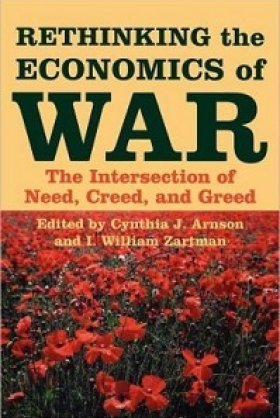Rethinking the Economics of War: The Intersection of Need, Creed, and Greed

-
Rethinking the Economics of War: The Intersection of Need, Creed, and Greed questions the adequacy of explaining today’s internal armed conflicts purely in terms of economic factors and reestablishes the importance of identity and grievances in creating and sustaining such wars. This collection of essays responds to current works asserting that the income from natural resources is the end and not just a means for warring rebel groups. The study puts greed in its place and restores the importance of deprivation and discrimination as the primary causes of armed conflict within states. Countries studied include Lebanon, Sierra Leone, Angola, the Republic of the Congo, Colombia, and Afghanistan.
Cynthia Arnson is Deputy Director of the Latin American Program at the Woodrow Wilson International Center for Scholars. William Zartman is Jacob Blaustein Professor of International Organizations and Conflict Resolution and Director of the Conflict Management Program at the Johns Hopkins School of Advanced International Studies.
Editors
 Cynthia J. ArnsonDistinguished Fellow and Former Director, Latin America ProgramSchedule interviewBrowse Insights & Analysis
Cynthia J. ArnsonDistinguished Fellow and Former Director, Latin America ProgramSchedule interviewBrowse Insights & AnalysisExplore More
Browse Insights & Analysis
Iraq Should Consider Extending UNAMI’s Mission
Posted date/time:
Middle East Dialogue February 2025 Meeting Report
Posted date/time:

